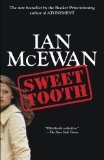Summary | Excerpt | Reading Guide | Reviews | Beyond the Book | Readalikes | Genres & Themes | Author Bio

A Novel
by Ian McEwan
At that point he feels the need to sit down. The secretary, who has been hovering, tactfully leaves the office and closes the door. So much good stuff carefully accumulated over the years, and so much of sentimental value, including a rope he once used to save a friend's life during a descent in a storm in the Andes. Even if the insurance covers it all, which Sebastian doubts, he knows he will never replace his mountaineering equipment. There was too much of it, there are too many other priorities. His youth has been stolen. With his upright, good-hearted tolerance deserting him, he imagined his hands closing around the thief's windpipe. Then he shakes his head to dismiss the fantasy. Monica is telling him that the police have already been round. There is blood on the broken windowpane. But it looks like the thief wore gloves, as there are no fingerprints. He tells her that there must have been two burglars at least, to lift all his gear out of the cupboard and carry it quickly from the house. Yes, she agreed in her affectless voice that there must have been two.
At home that evening he can't resist punishing himself by opening the cupboard under the stairs and gazing at the space where his equipment was. He restored the buckets and mops and brushes to their upright position, then he went upstairs to look in his sock drawer, where he had kept his camera. The thieves knew what to take, though the hair dryer matters less since there are two. This latest setback, this assault on their domestic privacy, does nothing to bring Sebastian and Monica closer. After a brief discussion they agree not to tell the children about the break-in and she goes off to her class. In the days that follow he feels so low he can barely bring himself to make the insurance claim. The full-color handbook boasts of "solid protection" but the small print in the schedule is miserly and punitive. Only a fraction of the camera's value is covered, and the climbing gear not at all because he failed to itemize it.
Their dreary coexistence resumed. A month after the burglary, the same school secretary seeks out Sebastian at break to tell him that there's a gentleman to see him in the school office. In fact he is waiting for Sebastian in the corridor, holding a raincoat over his arm. He introduces himself as Detective Inspector Barnes and he has a matter to discuss. Would Mr. Morel care to drop by the police station after work?
A few hours later he is back at the front desk where he reported the mugging before Christmas. He is obliged to wait for half an hour before Barnes is free. The DI apologizes as he shows him up three flights of concrete stairs and ushers him into a small darkened room. There was a fold-down screen on a wall and a film projector in the center of the room balanced on what looked like a barstool. Barnes showed Sebastian a seat and began his account of a successful sting. A year ago the police rented a run-down shop in a side street and staffed it with a couple of plainclothes officers. The shop bought secondhand goods from the public, the idea being to film thieves as they came in with stolen goods. With a number of prosecutions now under way, the cover has been blown and the shop has closed. But there are one or two loose ends. He dims the lights.
A hidden camera is positioned behind the "shop assistant" and gives a view of the door onto the street and, in the foreground, the counter. Sebastian has already guessed that he is about to see the young guy who mugged him come into the shop. With a successful identification, he'll be done for armed robbery, and that will be fine. But Sebastian's guess is wildly wrong. The person who comes in with a holdall and sets down on the counter a radio, a camera and a hair dryer is his wife. There she is, in the coat he bought her some birthdays ago. By chance she turns and looks toward the camera, as if she has seen Sebastian and is saying, Watch this! Soundlessly, she exchanges a few words with the assistant and together they go outside and come back moments later dragging three heavy canvas bags. The car must be parked right outside. The shop assistant peers inside each of the bags, then goes back behind the counter, glances over the items. There follows what must be a negotiation over prices. Monica's face was lit by a bar of fluorescent light. She seemed animated, even elated in a nervous sort of way. She smiled a lot and at one point even laughed at a joke the plainclothes policeman made. A price is agreed, banknotes are counted out, and Monica turns to leave. At the door she stopped to make a parting remark, something more elaborate than a good-bye, and then she was gone and the screen went black.
Excerpted from Sweet Tooth by Ian McEwan. Copyright © 2012 by Ian McEwan. Excerpted by permission of Nan A. Talese. All rights reserved. No part of this excerpt may be reproduced or reprinted without permission in writing from the publisher.
Heaven has no rage like love to hatred turned, Nor hell a fury like a woman scorned.
Click Here to find out who said this, as well as discovering other famous literary quotes!
Your guide toexceptional books
BookBrowse seeks out and recommends the best in contemporary fiction and nonfiction—books that not only engage and entertain but also deepen our understanding of ourselves and the world around us.